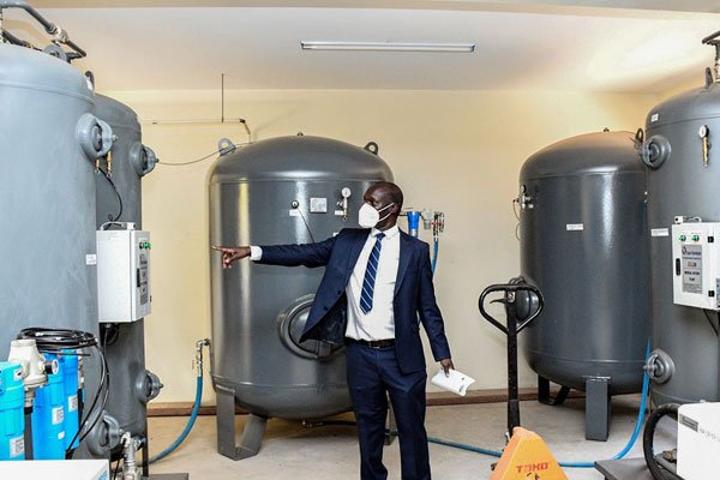Africa-Press – Uganda. Some Covid-19 survivors in the country are haunted by chest pain, fatigue, loss of smell and taste. Others are grappling with a painful cough that has refused to go away even after recovering from the deadly disease.
The people Daily Monitor talked to shared details on how they are wrestling a range of debilitating long-term effects, which are affecting their daily lives.
Several months after doctors declared them recovered from coronavirus, some survivors have anosmia (diminished sense of smell), chronic fatigue and anxiety, chest pain, brain fog (lack of mental clarity), breathing difficulties, persistent headaches and recurrent fever as some of the most common long-term effects reported by survivors.
The survivors say they are getting limited support from hospitals or healthcare workers after being declared to have recovered from the disease.
Ms Remmy Besiima, a lawyer in Kampala, is still affected by Covid-19 illness that struck her in September.The lawyer came down with Covid-19 symptoms and like many coronavirus patients, spent weeks undergoing medication.
But even after completing the medication and testing negative for the virus, Ms Besiima said life has not returned to normal.“There is chest pain and cough that have refused to go away, four months after I recovered,” she told Daily Monitor in an interview.
She added: “Then there is also stigma. People tell their friends to put on face masks when they see you coming towards them. Some of us don’t get stigmatised just like that.”People who have recovered from Covid-19 can’t spread the virus to others unless they become re-infected themselves, according to health experts.
Ms Besiima said at night, when it is cold, there is that sharp coldness that tears through her chest, but that she has had to devise means to push on with life.“So, you have to cover up and dress up at night when you are going to sleep. Also, when I take cold things, the chest pain comes. I am avoiding cold things and alcohol,” she said.
Ms Besiima said she is steaming with local herbs three times a week.“And after steaming, I feel so good. That sharp coldness that passes through the chest, when I steam, doesn’t come for like three days. Once in a while, I still take vitamin C and zinc,” the lawyer said.
Another Covid-19 survivor, Ms Prudence Atukwatse from Mukono District, was hit by the contagious virus in December, and life has never been the same again.
“I am still feeling headache, chest pain and fatigue, months after I did the second Covid test and it turned out negative,” she told this newspaper.
She added: “Medical workers told me to keep taking painkillers, and that is what I did. But I was too tired of medicine because I started taking medicine from the day I started showing Covid symptoms.”
She said that to deal with fatigue and moments when she is unwell, she delegates work. “I have had to prioritise what I give my attention to. At the work place, I delegate and at home, I have a maid and children who are in this long holiday. So I make sure they do some of the work and support me here and there,” Ms Atukwatse said.
Acceptance issuesShe added that she struggled to start interacting freely with colleagues when she resumed work.
“I was the first person to get Covid in the organisation I work with, maybe others were asymptomatic cases. Although there was no stigma, I doubted whether people were comfortable with me,” Ms Atukwatse recalled.
She added: “It took me one week to start mingling freely with others and be comfortable with others.”The profound mark the disease has made on Ms Atukwatse’s life is not far from Mr Risdel Kasasira’s experience.
Mr Kasasira is a journalist at Nation Media Group who survived the disease after being admitted to Mulago hospital in September following a severe illness. He said he is still struggling with fever and pain around his chest and ribs, months after he was declared as being free from the virus.
“There is that pain that comes when you sit for long, you find your chest is heavy and then there is that sharp pain that cuts across the chest and there is also pain around the ribs,” Mr Kasasira said.
He added: “Then also, when you sleep, you feel uncomfortable around the ribs.” Asked what health experts have recommended as a tool to recover fully, he said: “Doctors tell you to go and work out, take fruits and continue with the concoctions of lemons, ginger….”
While some persons with Covid-19 recover and return to normal health, other patients can have symptoms that can last for weeks or even months after recovery from acute illness.
Even people who are not hospitalised and who have mild illness are reporting long term effects, according to findings from the interviews conducted by this newspaper last week.
Doctors speakDr Emmanuel Tugaineyo, the director of Mbale Regional Referral Hospital where Covid-19 patients are being treated, confirmed that some survivors and his staff who got infected but recovered are reporting a number of after-effects.
“Even after they get discharged, they continue having issues of chest pain, fatigue, some kind of mental disorientation and headache. Those are more of short term and they eventually go away,” he said.
Some Covid-19 patients, however, say some long term effects seem not to be going away several months after recovering.
Dr Rosemary Byanyima, the deputy director of Mulago National Referral Hospital, said the after-effects are caused by psychological issues or actual damages to the body that may take time to wane.
“If the lungs get inflamed, it may heal but leave scars and that may leave a long term effect,” she said.
A study published in MedRxiv, a preprint medical journal, last month by Sandra Lopez-Leon from the United States of America, said “more than 50 long-term effects of Covid-19” have been reported globally.
The study which assessed data of 47,910, “the five most common symptoms were fatigue (58 per cent), headache (44 per cent), attention disorder (27 per cent), hair loss (25 per cent), and dyspnea (24 per cent).”
The study reinforced that the long term effects are either caused by damages to the lungs and other body organs or “several neurological and psychiatric symptoms such as headache, attention disorder and anosmia could be related to the direct effect of the infection, brain damage, physiological compromise, side effects of medications, and social aspects of having a potentially fatal illness.”
The Ministry of Health is working with medical experts to provide adequate support to people who are suffering from the long term effects of Covid-19, according to Dr Byanyima of Mulago Hospital.
“We are setting up at Mulago Hospital a clinic to follow up on those patients [survivors who are grappling with long term effects from Covid-19] along with the Ministry of Health,” she said.
She added: “We want to pitch up a tent which was given to us by UNICEF. There will be three big tents as a follow-up clinic. Even those who are undergoing home-based care can come if they want to consult.” She didn’t clarify when the clinic will start operating.






